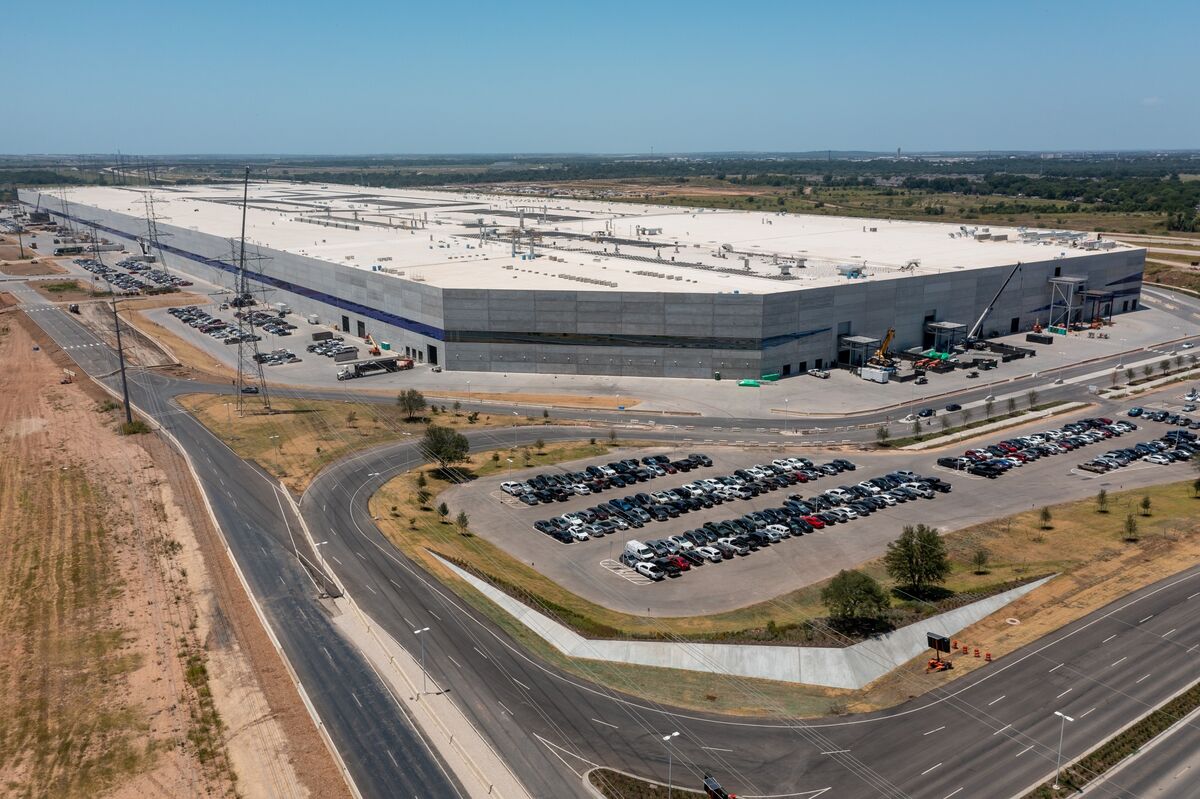- cross-posted to:
- enoughmuskspam@lemmy.world
- cross-posted to:
- enoughmuskspam@lemmy.world
Tesla Gets a $94 Billion Reality Check as EV Winter Sets In::Tesla Inc. had a blockbuster 2023, as its shares more than doubled in 12 months. But 2024 is starting on a different note, with Elon Musk’s electric vehicle maker off to its worst start to any year — ever.
“EV winter” is a silly framing. Many Chinese EV companies are on a roll, with BYD just surpassing Tesla in EV shipments in the last quarter. EVs are now mainstream in China and the car markets in other countries won’t be far behind. Obviously, Tesla faces more challenges from the fact that it no longer has the market to itself, but competition is a good thing.
Removed by mod
In addition it’s not a stable, safe choice anymore because of the volatility of leadership. Musk’s increasing erratic behavior does not inspire confidence that Tesla will continue to be the darling it once was.
Lol yeah, i laughed when i read “EV winter”, no it’s not, it’s just Tesla having a bad day with their terrible build tech on wheel, while BYD, Greatwall, Geely, and many many other automaker from europe is catching up, with BYD surpassing them.
BYD has rode Teslas coattails for years. EVs in China didn’t take off until Tesla built a Gigafactory to supply their batteries.
The Chinese car market is dead right now, BYD and other EV makers are dumping their EVs on the global market at a steep discount (Subsidized hmmm by the state) to stay afloat. They’ve targeted their higher end EV products on the EU market because they don’t have protections in place like the US. The EU is going to stop this and well see their numbers drop.
didn’t take off until Tesla built a Gigafactory to supply their batteries
BYD doesn’t rely on Tesla to supply their batteries. It’s the other way round: BYD started out as a battery company, and Tesla relies on their batteries in Shanghai, Germany, and other factories. Tesla originally used batteries from CATL, another Chinese company, but started switching to BYD a few years ago.
only the fanboys didnt see this coming. the lack of a complete product lifecycle had to catch up with them at some point, and thats the least of their current problems.
zero quality control (and plummeting, somehow) and a reputation on the floor of the bathroom thanks to that nazi in charge… its only a matter of time until theyre sold off to a mature vehicle manufacturer.
Listen, I completely agree with most of what you said until the last sentence. Tesla’s been around for long enough that they’ll survive. If by “matter of time” you mean a few decades or longer, sure, I could see someone buying them. Don’t know how long you’ve been around for, but I’ve been hearing this same thing since they went public. Yet, here we are.
Tesla’s been around for long enough that they’ll survive.
How do you figure that works, and why couldn’t these guys figure it out?
Oldsmobile (1897-2004): Once a popular and innovative brand, Oldsmobile struggled in the later years with uninspiring models and eventually met its demise under General Motors.
Packard (1899-1958): Known for their luxury and craftsmanship, Packard couldn’t compete with rising costs and changing consumer preferences in the post-war era.
Studebaker (1902-1966): A pioneer in automotive design, Studebaker faced financial difficulties and ultimately lost market share to bigger players like Ford and GM.
Hudson (1909-1954): Merged with Nash to form American Motors, Hudson was known for its affordable and stylish cars, but ultimately couldn’t weather the competitive landscape.
Willys-Overland (1908-1963): Responsible for the iconic Jeep, Willys-Overland struggled with diversifying its offerings and was eventually acquired by Kaiser Industries.
DeSoto (1928-1960): A Chrysler brand known for its mid-range offerings, DeSoto faced declining sales and was eventually phased out in favor of other Chrysler models.
Mercury (1939-2011): Ford’s upscale division, Mercury faced competition from its own parent company and other luxury brands, leading to its discontinuation.
Plymouth (1928-2001): Another Chrysler brand, Plymouth offered affordable and practical cars, but couldn’t keep up with changing consumer tastes and was eventually discontinued.
AMC (1954-1988): Born from the merger of Hudson and Nash, AMC found success with innovative designs like the Jeep and Gremlin, but ultimately couldn’t overcome financial challenges and was acquired by Chrysler.
Saturn (1990-2010): General Motors’ attempt at a revolutionary, customer-centric brand, Saturn faced production issues and market challenges, leading to its closure.
Removed by mod
The same can be said of every single company then. I guess I don’t get why you would mention it.
But… you’re the one that brought up how long they’ve been around for.
You’re misreading their new argument. It may be worded differently, but it’s pronounced “well now I don’t want to talk to you anymore after you logically refuted my first argument”.
Tesla has a market cap of $800 billion.
To put it in perspective… GM is on track to earn that much money over the next one hundred years - they made $9b last year and $6b the year before (that was a low year, supply chain issues).
And even if they somehow found the money, regulators would likely block it.
Tesla, on the other hand, could buy GM if they wanted to. Not sure why they would though, since Tesla is successfully selling EVs (the future) and GM can’t figure out how to repeat that. GM’s EV cars are not profitable yet and they just discontinued their best model (the Bolt).
Comparing market cap to earnings just shows you have no clue
This place is pro-ev, but very anti-Tesla. So weird. They’re naming failed car companies and sure, it does prove their point, but most companies fail. I could literally say the same thing about Ford and Toyota. Who knows what happens in the future. Literally no one knows.
You’re the only one claiming to know they’ll survive. Other people are claiming nobody should know because your original argument for why they’ll survive doesn’t make sense. It’s funny how you’re now claiming to be the one that thinks the future is uncertain.
The thing a lot of people are still ignoring is Tesla isn’t just a car company.
Tesla is going to be more like General Electric than any of the traditional automakers and it’ll be more and more obvious as the years go on.
They design and build their own batteries. They are about to refine their own lithium. They are designing their own super computers. They sell batteries to consumer and commercial companies with software managed by AI to optimize the usage of those batteries.
They are going to keep coming out with other non car products, such as a residential HVAC system.
And they’re doing all this with industry leading margins on everything they do even after all the cuts.
They’re way more resistant to problems than some specific car brand that went under. Even if the car side of things falters, they still have everything else to help prop them up.
I don’t think anything is guaranteed one way or another, but Tesla is in a much better spot to survive longer term because of all the ways they can use their expertise.
I know most people don’t believe the Bot will amount to anything, and maybe they are right, but the very fact they are doing something like that is diversifying the risk they put into their AI division. Now it’s not just 1 failure point, they’ve found another way to benefit from their work.
Edit: and how could I forget the charging network. The whole car business itself could collapse and that’s a massive business of its own
Paywall. But I managed to see they said “Tesla has been hit with a barrage of negative news” and I think that’s disingenuous.
If Tesla wants to avoid the fate of the first US Football League who were scuttled by a dipshit know-nothing “billionaire” they need to kick Elmo to the curb. Otherwise they just continue to hemorrhage.
Of course, Elmo could get his shit together, buckle down and let the smart and talented people get on with it. Hahahahahaha
Tesla definitely sucks, but headlines like this are so useless. Check out a 5 year chart. Tesla stock hit a 2 year low at the beginning of last year…. that was significant, down to 120. Then it recovered to a fairly average price, where it’s been since then (this made musk the person to “lose” and “gain” record amounts of wealth in a short time). The recent dip hasn’t been extremely significant…. It’s like 245 to 217.
Yes, this “dip” is back to where they were on November 10, 2023, leaving the stock worth 66% more than it was a year ago.
Tesla stock
The price ain’t right.
Your argument assumes that the price of the stock is fundamental, rather than partly speculative. I don’t think that’s a fair valuation of Tesla stock due to the ability of Musk to drum up speculation value.
Oh, it’s still wildly overvalued. Tesla is worth more than half a dozen other automakers combined, and I don’t see any reason for that. I’m just saying the current price doesn’t really represent a large drop.
EV winter? When was EV summer?
Right after EV Spring Break
When subsidies and tax incentives made them competitive with new ICE vehicles for purchasers.
Anyone have a paywall free copy of the article to share?
www.bloomberg.com Tesla Gets a $94 Billion Reality Check as EV Winter Sets In Esha Dey 5 - 7 minutes
Tesla Inc. had a blockbuster 2023, as its shares more than doubled in 12 months. But 2024 is starting on a different note, with Elon Musk’s electric vehicle maker off to its worst start to any year.
The company has lost more than $94 billion in market valuation in just the first two weeks of 2024. It’s not hard to figure out why, as the Austin, Texas-based EV maker has been pounded by a barrage of negative news: an about-face on EVs from the car rental giant Hertz Global Holdings Inc., yet another price cut for its cars made in China, and signs of rising labor costs.
All of this comes in the face of slowing growth in demand for EVs, especially in the US.
“Investors’ main concern on Tesla is stagnating growth,” Cowen analyst Jeffrey Osborne said in an interview. The price cuts in China only fan those concerns, because it is starting to look like “a race to the bottom for the EV industry given intense competition in that market.”
Read more: Tesla Analysts Turn More Cautious on 2024 as EV Slowdown Looms
The hit to Tesla’s market capitalization to start the year is the biggest the company has seen over a similar period since it went public in 2010. In percentage terms, Tesla’s 12% drop since the start of January is the worst since 2016, when the stock fell 14% over the first nine trading days of the year.
To make matters worse, the odds of an imminent turnaround for the EV maker don’t look good.
Tesla has been cutting prices on its cars aggressively since early 2023 in an effort to boost demand. But the result has been a steady erosion of its once-hefty profit margin. Tesla’s automotive gross margin ex-regulatory credits for the third quarter fell to 16.3% from 27.9% a year ago. And the pressure is only mounting, now that production workers at Tesla’s US plants are getting pay raises.
“We are going through a cyclical downturn for EVs, but competitive dynamics are exacerbating the cyclical pressures,” Ivana Delevska, chief investment officer at Spear Invest, said in an interview. “Price cuts and plummeting margins are all a function of these unfavorable competitive dynamics.”
Adding to the woes, Tesla has had to re-route shipments destined for its Berlin plant after Western military actions and security concerns in the Red Sea, and is suspending most production at its plant near Berlin from Jan. 29 to Feb. 11, according to a person familiar with the matter. Not Strong Enough
Tesla first warned about the deceleration in EV demand during its October third-quarter earnings report. Almost immediately after, automakers and suppliers across the globe chimed in with their own downbeat forecasts. Many carmakers dialed back their plans for expansion.
Then, earlier this month, Tesla reported its fourth-quarter delivery numbers. While they were better than what analysts expected, they put the company behind China’s BYD Co. in global electric-car sales.
The result has been a rude awakening for Tesla investors. Last year, the stock was the eighth best performer in the S&P 500. So far this year, it’s the eighth worst.
Placeholder Value
Your guide to the future of cars, from reporters around the world.
Your guide to the future of cars, from reporters around the world.
Your guide to the future of cars, from reporters around the world.
Get Bloomberg’s Hyperdrive newsletter, delivered daily.
Get Bloomberg’s Hyperdrive newsletter, delivered daily.
Get Bloomberg’s Hyperdrive newsletter, delivered daily.
Naturally, Musk is taking a big hit personally. The world’s richest person, who gained more wealth in 2023 than anyone else on the planet, has seen his net worth shrink by $23 billion so far this year, according to the Bloomberg Billionaires Index. Musk regained the top spot on Bloomberg’s wealth index last year, overtaking Bernard Arnault, but now Jeff Bezos is rapidly closing in, with $179 billion to Musk’s $206 billion as of Friday’s close.
The bulk of Musk’s net worth comes from his 13% stake in Tesla and about 304 million exercisable stock options. He also owns about 42% of SpaceX, which is valued at about $53 billion, according to Bloomberg’s wealth index. Still The One
With all that being said, Tesla remains a key player in the global transition from gas-powered vehicles to largely electric ones. The reason: It’s so far ahead of its potential rivals. China’s BYD may have surpassed Tesla in the number of units sold, but it still lags in revenue and profits. And BYD doesn’t sell cars in the US, where Tesla remains the market leader.
Read more: Tesla Is Investors’ Standout Bet in a Hazardous EV Landscape
In many ways, Tesla’s biggest problem may be its past success and the hope it generated. As investors piled into the stock, Tesla’s market capitalization ballooned, making it way larger than any other car company in the world. However, with the shares priced for perfection, that also made them highly vulnerable to big reactions to any negative news.
That’s why so many Tesla proponents argue that it shouldn’t be compared to regular car companies. To them, the ultimate true value of the company rests in the future and it’s hope to develop the first truly self-driving vehicles. The only problem is Tesla has been promising this for years, and most experts say the technology is still years, maybe even decades, away.
“Tesla has not been able to deliver on fully autonomous driving and AI promises, which are already embedded in the valuation,” Spear’s Delevska said. “Being simply another automotive manufacturer is not going to cut it for a $750 billion valuation.”









